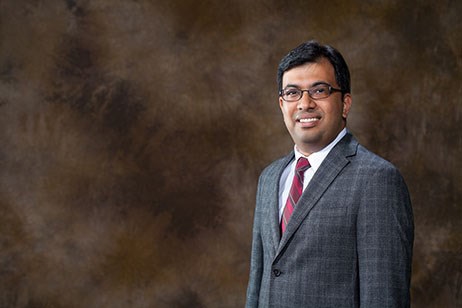The Department of Defense awarded $297,831 to Kartik Balachandran, associate professor of biomedical engineering at the U of A, to study the effects of particulate matter pollution on the nasal airway and lung interface.
Balachandran will create the first in vitro benchtop system to incorporate both the upper and lower respiratory systems into a single model.
Over the two-year term of the grant, Balachandran will create and validate a novel airway-lung-on-a-chip, or AirLOC, system engineered from human cells. This will incorporate a multilayered, cell culture platform that mimics both normal and asthmatic nasal and lung epithelia – the tissue that covers all organs and body surfaces. These 3-D chips can replicate several aspects of human physiology, and, according to Balachandran, “can recreate complex organ functions, tissue-barrier properties, parenchymal tissue function and multi-organ interactions.”
AirLOCs will be exposed to particulate matter of different sizes for differing durations. Both air flow and blood flow will be simulated as well as the connection from the nasal airway compartment to the bronchial airway compartment.
The association between respiratory illness and exposure to particulate matter is well documented. Particulate matter can take the form of anything from dust storms to vehicular exhaust. Larger particles tend to lodge in the upper respiratory system and lungs while smaller particles can penetrate deeper into the lung’s alveoli sacs. The accumulation of particulate matter can lead to increased risk of chronic obstructive pulmonary disease, as well as asthma, allergic rhinitis and other respiratory infections.
“We are very excited to receive this grant from the DOD,” Balachandran said. “We will study the pathological effects of particulate matter in this project. In the future, we hope that this AirLOC model can be used to study other diseases and problems that affect the human upper and lower respiratory systems.”
Organs on a chip are something of specialty for Balachandran, who is also developing a chip that simulates the aortic valve tissue to study the impact of SARS-COV-2 on heart pathology.
About the University of Arkansas: As Arkansas' flagship institution, the U of A provides an internationally competitive education in more than 200 academic programs. Founded in 1871, the U of A contributes more than $2.2 billion to Arkansas’ economy through the teaching of new knowledge and skills, entrepreneurship and job development, discovery through research and creative activity while also providing training for professional disciplines. The Carnegie Foundation classifies the U of A among the few U.S. colleges and universities with the highest level of research activity. U.S. News & World Report ranks the U of A among the top public universities in the nation. See how the U of A works to build a better world at Arkansas Research News.
Topics
Contacts
Kartik Balachandran, associate professor
Department of Biomedical Engineering
479-575-5697, kbalacha@uark.edu
Hardin Young, assistant director of research communications
University Relations
479-575-6850,
hyoung@uark.edu
